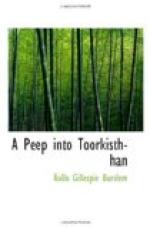After we had pitched our tents, many Hindoos who trade in fruit, the staple produce of the country, came to pay their respects, and one of them informed me that about four miles across the mountains to the north-west in the Sheikkallee Huzareh country, there were three lakes so extensive that it occupied a well-mounted horseman a whole day to ride round them. No European, he said, had ever visited them; one gentleman, whose name he did not know, had tried to reach them, but drank so much brandy by the way that he was obliged to lie down instead, and the guide had great difficulty in getting him back. I regretted that the expiration of my leave prevented me from exploring these lakes, which I do not think have ever been examined by any of our engineers; but I hope that, had I undertaken the excursion, I should not have fallen into the same scrape the above mentioned gentleman did. The gardens belonging to the chief were well worth looking at, with a beautiful stream of water flowing through the centre, tortured by artificial rocks into fifty diminutive cataracts.
We were well satisfied with our quarters, but after night-fall intimation was given us that unless we kept a sharp look-out it was very probable we might have some unwelcome intruders before morning, as a neighbouring fort was hostile to that of Shukkur Durrah; and moreover, that the inhabitants of the fort itself were in the utmost dread of a band of desperadoes who infested the adjacent hills and occasionally paid them a nocturnal visit. Luckily for us they were in hourly expectation of such an intrusion, for their fears kept them on the alert, and they had a watchman on each of the towers, whose sonorous voices proclaimed every hour of the night. Our guard was now reduced to six, the remainder being employed to escort Sturt’s instruments into Cabul, so that I really did not much like the appearance of things; when about midnight my servant reported to me that the sentry saw a great many lights moving about us.
I instantly rose and distinctly observed the lighted slow matches of firearms; there might have been forty or fifty. The sentry challenged, but the ruffians returned no answer, and decamped, finding us on the alert, and probably not knowing our weakness; for had we come to blows our party must have got the worst of it, though I have not the least doubt that our Affgh[=a]n guard would have stood by us even against their own countrymen.
The next morning we proceeded along a very pretty road, flanked by green hedgerows full of wild flowers, and varied occasionally near the houses with parterres of roses of exquisite fragrance. My route lay to B[=a]ber’s tomb, but Capt. Westmacott being anxious to reach C[=a]bul could not accompany me, so we parted, mutually regretting that we had so short a time to spend in this delicious region. At B[=a]ber’s tomb the Kazi of the adjacent village endeavoured to play off on me a trick, well known to old campaigners, by assuring me that unless I took from his hands a guard of at least twelve men (of course paying them for their services), my life would not be safe during the night. I refused his guard, and the only annoyance I experienced was from myriads of musquitoes, who tormented me incessantly throughout the night. I rode into camp the following day, and was delighted to find myself once more with my brother officers.




